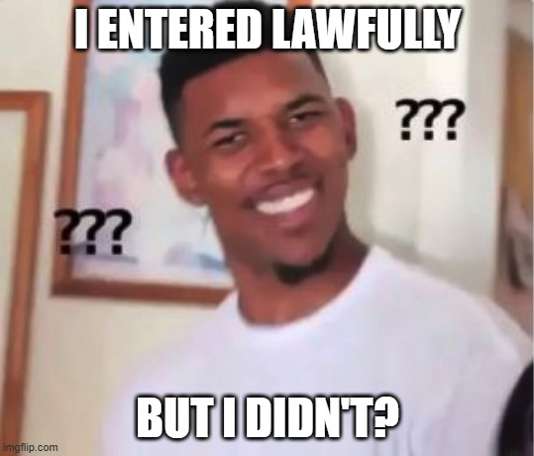This sponsored column is by Law Office of James Montana PLLC. All questions about it should be directed to James Montana, Esq., Doran Shemin, Esq., and Laura Lorenzo, Esq., practicing attorneys at The Law Office of James Montana PLLC, an immigration-focused law firm located in Arlington, Virginia. The legal information given here is general in nature. If you want legal advice, contact us for an appointment.
Loyal Statutes of Liberty reader(s) know that we at the Law Office of James Montana PLLC are not always pleased with how the various immigration agencies interpret the law.
For example, we recently talked about the bonkers way that U.S. Citizenship and Immigration Services (USCIS) dealt with certain immigrants who return to the United States after a brief trip abroad with a travel permit.
But we write with great news! USCIS has finally decided to reinterpret not only one, but TWO important pieces of the law, both in favor of our clients!
First, let’s start with the previously discussed travel permit issue. Under an administrative decision called Matter of Z-R-Z-C-, USCIS began to reject lawful entries using a travel permit for certain green card applicants who have Temporary Protected Status (TPS).
Many TPS beneficiaries originally entered the United States illegally to flee horrendous conditions in their home country. Thus, even after the TPS holder traveled with a permit and reentered the United States legally using a travel permit, USCIS said that the TPS holder was “reverted back” to their prior status at their original entry.
This meant that despite the more recent lawful entry, the TPS holder was still considered to have last entered the country unlawfully, which ruined their chances of applying for a green card.
But this position has now been totally reversed! USCIS announced that it has rescinded Matter of Z-R-Z-C-. Now, if a TPS holder travels and reenters with a valid travel permit, that person will be considered to have last entered the United States lawfully.
This is a huge win for TPS holders, many of whom have lived in the United States for at least 20 years. Many of them now have U.S. citizen family members or U.S. employers who wish to help them get green cards. We favor this interpretation. The law is now more reasonable (or, if you prefer, less bonkers). If the government ‘inspects’ you on entry, it will no longer claim that you entered without inspection, depending on whether or not you entered before Z-R-Z-C.
The second major update needs some prefatory legal explanation. For an immigrant to be eligible for a visa or a green card, the immigrant must be admissible to the United States. There are many reasons an immigrant may be inadmissible, or barred, from receiving a visa, green card, or entering the United States. The two bars at issue here are referred to as the three- and ten-year unlawful presence bars.
[Author’s note: This article and the new USCIS update do not apply to the third unlawful presence bar called the permanent bar. We may address that bar at a later date.]
If an immigrant comes to the United States, stays for more than six months, and then departs, they will be forced to wait outside the United States for three or ten years, depending on the circumstances. An immigrant can acquire unauthorized time in the United States — termed ‘unlawful presence’ by immigration lawyers — in a variety of ways.
Some common examples are (1) entering the United States without a visa or other entry document; (2) overstaying his or her authorized period of time to remain in the United States under the terms of a visa; or (3) violating the terms of a visa and therefore throwing themselves out of status. A common example of the third category is a person who entered with a visitor visa and while still within the authorized period of stay, begins working without authorization.
Now that we know how someone begins accruing unlawful presence, how much time is “enough” time to trigger one of the unlawful presence bars? If an immigrant accrues 180 days but less than one year of unlawful presence, she will trigger the three-year bar upon exiting. However, unlawful presence of one year or more will trigger the ten-year bar.
Now for the interpretations of the law. Historically, if an immigrant triggered the three or ten-year bar upon exiting, the immigrant had to remain outside of the United States for either that three- or ten-year period before being eligible to apply for a visa, green card, or admission to the United States. But this interpretation is no more!
USCIS announced that it would now interpret these bars such that the three- or ten-year periods could be served either inside or outside of the United States. This is great for immigrants because being outside the United States for long periods of time can cause extreme suffering not only to the immigrant, but also their family members.
Here’s a simple example: Jane entered the United States with a visitor visa in May 2010, and she was allowed to stay in the United States as a visitor for six months. However, Jane remained in the United States for a total of 2 years and left in May 2012. Upon her exit, Jane triggered the ten-year bar. She later reentered the United States using her visitor visa in 2013.
Jane has remained in the United States since her last entry into the United States. Now, Jane is married to a U.S. citizen and wants to apply for a green card based on her marriage. Even though Jane triggered the ten-year bar in May 2012, as of today, the ten-year bar has expired even though most of the ten-year period was spent in the United States.
This interpretation of these unlawful presence bars will eliminate the need for many immigrants to apply for waivers of inadmissibility, which can be difficult to obtain and are costly. However, for anyone who may consult with a lawyer about this topic, we urge you to be very detailed about all entries, time spent in the United States, and departures to ensure that you are eligible for a green card or visa.
As always, we welcome comments and will do our best to respond. These are difficult topics, so ask away!




